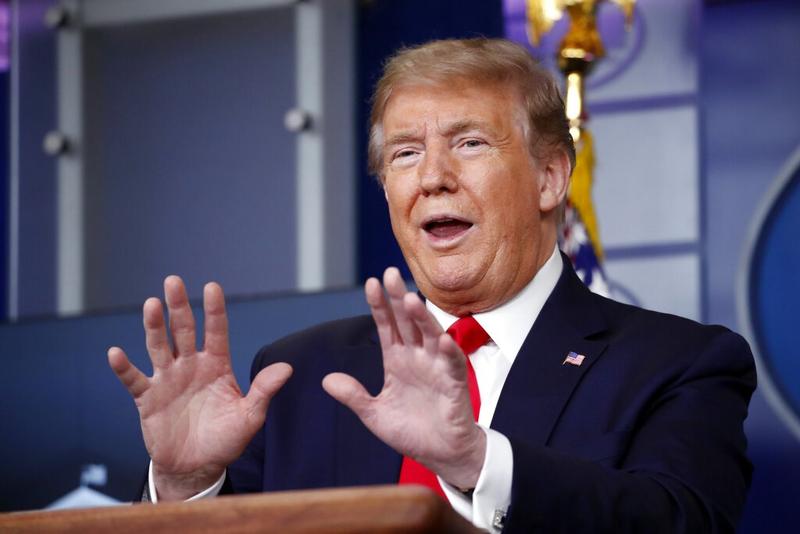 US President Donald Trump speaks about the coronavirus in the James Brady Press Briefing Room at the White House, in Washington, April 13, 2020. (ALEX BRANDON / AP)
US President Donald Trump speaks about the coronavirus in the James Brady Press Briefing Room at the White House, in Washington, April 13, 2020. (ALEX BRANDON / AP)
US President Donald Trump said on Monday that he, not the governors, "calls the shots" when it comes to reopening the country's economy, and he supported Anthony Fauci, a day after retweeting a post that called for firing the nation's top infectious diseases expert.
"When somebody is president of the United States, the authority is total," Trump said at a White House coronavirus briefing.
Trump has said that when to open the US economy will be "the biggest and most difficult" decision he will make in his life.
"For the purpose of creating conflict and confusion, some in the Fake News Media are saying that it is the Governors decision to open up the states, not that of the President of the United States & the Federal Government," Trump wrote on Twitter on Monday.
Trump has said that when to open the US economy will be "the biggest and most difficult" decision he will make in his life
"Let it be fully understood that this is incorrect. It is the decision of the President, and for many good reasons," he added.
He did not offer details about the reopening plan and was noncommittal on whether the economy would be open on May 1, saying that it would be announced soon.
ALSO READ: Trump says reopen by Easter, business groups say not so fast
Monday marked one month since Trump declared a national emergency on March 13, when the US had fewer than 2,000 confirmed cases and 41 deaths from COVID-19.
The number of infections in the US surged past 582,594, while deaths topped 23,649 as of early Tuesday, according to a tally by Johns Hopkins University.
Trump's eagerness to reopen the economy has brought both support and warnings from medical experts, business executives and politicians.
Peter Navarro, White House trade adviser, warned on Monday that a prolonged shutdown could be more detrimental to the US than the virus itself.
"It's disappointing that so many of the medical experts and pundits pontificating in the press appear tone deaf to the very significant losses of life and blows to American families that may result from an extended economic shutdown," The New York Times on Monday quoted Navarro as saying.
Robert Redfield, director of the US Centers for Disease Control and Prevention, however, said that he expected a reopening to play out "community by community, county by county" but that the US would first need to "substantially augment our public health capacity to do early-case identification, isolation and contact tracing".
Previously, the World Health Organization (WHO) warned that premature lifting of restrictions on peoples' movements by countries fighting the coronavirus pandemic could spark a "deadly resurgence".
In response to Trump's criticism of the organization, Tedros Adhanom Ghebreyesus, director-general of the World Health Organization, said on Monday that he believed the US will maintain a "supportive "attitude toward the international health body.
The US is by far the largest contributor of funds to the WHO, but it is in arrears. According to the Guardian newspaper, the US is around US$200 million in arrears in assessed contributions, or national membership fees.
The Washington Post reported on Monday that Trump is likely to announce restrictions on US funding for the WHO this week over its alleged handling of the novel coronavirus pandemic.
Trump hinted last Friday at a temporary hold on US funding. His comments are seen by some as a deflection from the sharp criticism his own handling of the pandemic has received at home. In the past week The Washington Post and The New York Times have published lengthy articles detailing what they call his poor response to the virus threat since late January, despite warnings that came from US agencies and his advisers.
Monday's briefing also saw a dramatic twist in Trump's attitude toward Anthony Fauci, director of the National Institute of Allergy and Infectious Diseases.
READ MORE: Trump defends response to coronavirus, says he's not firing Fauci
"I like him," Trump said during the news briefing. "Today I walk in and I hear I'm going to fire him. I'm not firing. I think he's a wonderful guy."
A day before the briefing, Trump retweeted a call to fire Fauci, who said in an interview that lives could have been saved if the country had shut down sooner during the novel coronavirus outbreak.
Pan Mengqi in Beijing contributed to this story.


